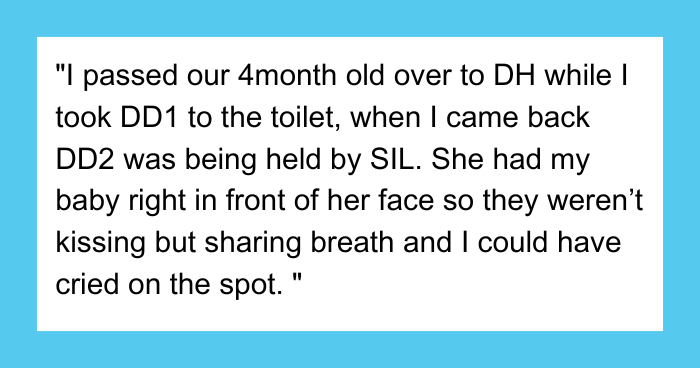Mom Sets Boundaries: ‘I Don’t Feel Comfortable With My In-Laws Holding My Baby
Mother vented online after tense family outing led to angry scenes. The issue? Her 4-month-old baby was being held by her in-laws without her knowledge. At a Christmas gathering in the pub at one of these terribly annoying moments, her husband actually passed their baby to his sister, knowing well her anxiety about germs. It got out of hand and one thing led to another and someone else got his hand into the babys mouth, it spread like wildfire until an aunt was putting her fingers in the babies mouth. Though the baby appeared happy, the mother was left feeling frazzled and guilty that she didn’t stick up for herself assertively in the first place.
This is against the backdrop of a flu season many believe is the worst in years, and her increased germaphobia. In addition, her in-laws have a frosty relationship with her and do not pay attention to her boundaries. It’s hard to speak up when her own family isn’t involved because there could be so many tensions. Now, she’s doubting whether it’s her feelings that are unreasonable or her as a mother with her instincts coming out too strong as if trying to protect her cubs.
Not all parents feel comfortable letting other people hold their newborns

Just like this mom, whose germaphobia became so intense she didn’t want to let her daughter near her in-laws
















Parental Anxiety and Germophobia
As new parents, it is common to become a bit possessive, especially about germs and infants. And babies do not have the ability to close their mouths on the floors or seats where thousands of people and germs have been before, and their immune systems are still new and underdeveloped until at least 6 months, which is why the American Academy of Pediatrics will say that babies less than 6 months are at high risk for diseases like the flu and RSV (a nasty virus that makes it hard to breathe). Hey my fellow mamas: OP is right when she says that exposing her baby to germs at a social event is something the health doctrine is concerned about; she brings up a great point about maybe trying to not be near close to people out of your immediate household throughout peak flu season.
What she’s feeling, though, is also part of a bigger phenomenon called postpartum hypervigilance — the tendency to be more worried than usual, especially in the first few months after giving birth. You have less and, in some cases, perhaps none, of your old life, and the hormonal rollercoaster and sleep deprivation and primal impulse to protect a fragile newborn do not help. Her response might sound over the top to some ears but it is just the instinctive protective nature of a mother wanting to keep her young baby safe from harm.
Boundary Setting in Blended Family Dynamics

Setting and holding space with extended family is especially hard. Because as she later reveals, her relationships with her in-laws have not always been the best. Unresolved conflict common in blended families leads to discomfort when families do come together, especially if lines are not clearly drawn (Studies in Family Relations).
It made her the other one who was supposed to hold the baby, when her husband just offered it to anyone without asking her first. When one co-parent is trying to handle a strained in-law relationship, it is especially important that both parents are on the same page about boundaries for healthy co-parenting. If the respect is not mutual, it will cause an opportunity for resentment and perhaps conflict in the marriage.
How to Navigate the Situation
Experts recommend several steps to help parents like OP manage these situations:
- Communicate Expectations Early
It’s vital to have an honest conversation with her husband about how she feels when her boundaries are disregarded. By presenting her concerns as shared parenting goals (e.g., protecting the baby’s health), rather than personal grievances, she can foster a more productive dialogue. - Use Neutral Phrasing with In-Laws
When addressing in-laws, framing requests as health-related concerns (“We’re being extra cautious about germs this season”) can reduce the likelihood of defensive reactions. Studies show that people respond better to neutral explanations rather than directives that may feel accusatory. - Rely on Non-Confrontational Techniques
If confrontation feels uncomfortable, OP can redirect interactions. For example, if someone reaches for the baby, she can respond with a polite but firm, “She’s fussy today; I’ll keep her close.” This allows her to set boundaries without escalating tension.
Verdict: Not the A-Hole
OPs fears are understandable health fears and she wants to keep her baby safe. The wheat, as far as that goes, is maybe it was not realistic to prep her in-laws to not be the atrocious beings which they though, but I can relate with the previous mother — her feelings are totally bona fide & husband should honour her on this since she was tending to the baby, not them. From there, I think maintaining open lines of communication with her partner, being straightforward in setting boundaries with extended family, but doing so with the utmost respect and kindness is going to be critical, and should allow for a much healthier relationship for all of the parties involved.
Readers believed that mom’s level of anxiety isn’t standard








